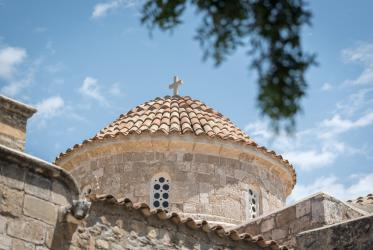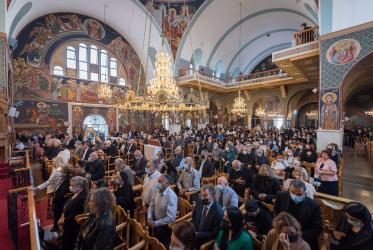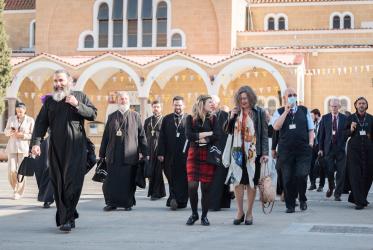Document
Chambésy, Switzerland, 2-5 December 1999
Before the inaugural meeting of the Special Commission in Morges, in December 1999, the Orthodox participants in the Special Commission met for three days at the Centre Orthodoxe in Chambésy. This text is a point-by-point summary of the discussion, which was reviewed and corrected by the participants to serve as the meeting's report. It was used as a background document at the Morges meeting but was inadvertently left out of the Morges Dossier.
- The present crisis in Orthodox participation in the World Council of Churches is marked by several milestones:
- the withdrawal of the churches of Georgia and Bulgaria from WCC membership,
- the meeting of Eastern Orthodox churches at Thessaloniki, April-May 1998,
- the Orthodox Pre-assembly meeting, Damascus, May 1998,
- the Eighth Assembly of the WCC, Harare, December 1998.
- Although further erosion of Orthodox membership in the WCC was avoided at Harare, the Assembly understood that the tensions and challenges of Orthodox participation in the WCC must be addressed in a serious way, and therefore affirmed a Special Commission.
- While the current crisis is clear and unavoidable, there have been difficulties, tensions and challenges in the relationship of Orthodox churches and the WCC from the beginning.
- It must be noted that the WCC of today is not the WCC of 1948, the Protestant churches today are not the Protestant churches of 1948, and the Orthodox churches and their situations have also changed since 1948.
- It must be noted also that the Orthodox churches are 22 member churches within a total of 328 member churches of the WCC, but that baptised Orthodox are nearly one half of the total number of baptised in the WCC member churches.
- Orthodox member churches feel more sharply than ever before a deep ecclesiological discomfort, a dissatisfaction with the status of permanent structural minority, a dismay at the marginalization of the Orthodox perspective.
- The Orthodox welcome the rediscovery of ecclesial unity among the Protestant churches, as manifested in the communion among them and the mutual recognition of ministries.
- The Orthodox grieve at the tendencies and developments in Protestant churches which have made their unity of faith with the Orthodox churches more and more remote and the participation of the Orthodox in the WCC more and more difficult.
- In the midst of this apparently irreducible tension and even contradiction, we seek structures of governance, processes of dialogue, and forms of co-operation which will keep before all churches the challenge of the quest for Christian unity while respecting the ecclesiological integrity of the Orthodox churches. We seek a Christian solidarity which challenges proselytism and missionary competition. We seek an expression of the ecumenical vision which will not be dominated in theological, ecclesiological, cultural and procedural terms by any one perspective.
Questions
- How can WCC governance structures become truly inclusive of the Orthodox perspectives? of the Orthodox ethos?
- What is required of the Protestant member churches to make this possible?
- What is required of the Orthodox member churches to make this possible?
- What are the possibilities for "confessional" or "family" structures in the WCC? (We note that these terms are foreign to Orthodox self-understanding, and that we use them with hesitation and with reservations.)
- What changes in governance structure and style will best serve the WCC and all its member churches? Bicameral structure (as outlined in a proposal by Metropolitan Kirill of Smolensk on behalf of the Moscow Patriarchate)? Equal representation of Protestant and Orthodox churches in existing governance bodies? Equal representation in a newly created governance mechanism? Decision-making by consensus rather than by parliamentary procedures and majority/minority vote?
- What are the obligations of the WCC and its member churches, both Protestant and Orthodox. towards the Roman Catholic church and conservative Evangelical and Pentecostal churches to make possible a wider and more inclusive ecumenical fellowship? (We note that in a more inclusive ecumenical fellowship we would also seek an appropriate way to ensure the ecclesiological integrity of the Orthodox churches).
- What must the WCC do to discern the limits of acceptable diversity within the ecumenical fellowship, taking fully into account the theological, ecclesiological and ethical perspectives of the Orthodox churches?
- Building on the CUV orientation which places the churches at the center of the WCC, what is necessary to make the programmes and publications of the WCC more disciplined and fully accountable to the member churches through the governing bodies of the WCC?




